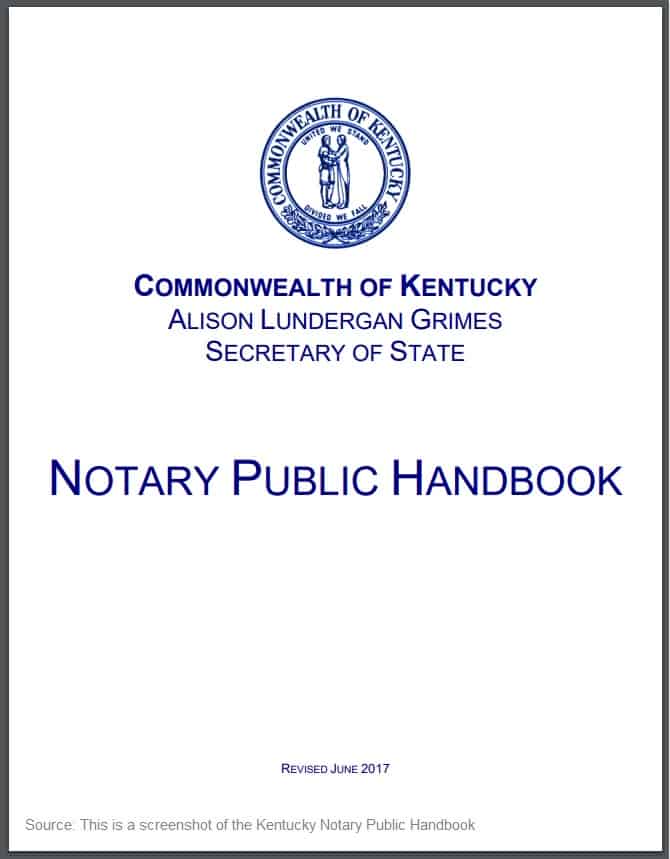(**) Disclosure: This post may contain affiliate links, meaning RealEstateCareerHQ.com will get a commission if you decide to make a purchase through the links, but at no additional cost to you.
To become a notary loan signing agent in Kentucky, an applicant must submit a Notary Public Application to the Kentucky Secretary of State, pay the $10 filing fee, take an oath of office, obtain the surety bond, purchase the notary seal and other business supplies.
Although you could work on different types of documents, the loan signing business in the real estate market seems to be a lucrative niche.
So what does a loan signing agent do? When people are getting a mortgage to purchase a house, or they need to refinance their property, there will be loan documents involved. Your role as a notary loan signing agent is to walk through the set of loan documents with the borrower and witness them in signing the paperwork.
You would also need to verify the identity of the signers, place the notary stamp on the signed documents, then send them back to the signing services company or closing attorney.
But keep in mind that you should NOT be providing legal advice, and you cannot explain the terms of the loan documents to the borrower.
In this guide, you’ll learn the steps to become a notary signing agent in Kentucky, income updates, and FAQ about this profession.
Note that there are two types of notary publics in Kentucky, which are Notary Public-State at Large, and Notary Public-Special Commission. Unless I mention specifically, most of the contents in this guide are about Notary Public-State at Large. However, I will also explain the differences between the two commissions.
Also before we start, I want to give a brief disclaimer. This post is not intended as legal advice or state/federal notary public training. It is for general information only. Please check with your state to be sure that loan signing agents are utilized in the closing process. Always follow your state’s notary laws and best practices.
Would you like to learn how to make $75 to $200 per signing appointment? You must check out the Loan Signing System from Mark Wills. (**) This is one of the best training programs for loan signing agents. Many students have achieved remarkable business success after taking this program.
6 Steps to Become a Notary Signing Agent in Kentucky

Step 1: Meet the state-eligibility requirement
- Be at least 18 years of age
- U.S Citizen or permanent legal resident
- Have a legal residence/ maintain an office/ regular employment in the Kentucky county where the application is made
- Able to read and write English
- Not disqualified under KRS 423.395.
Step 2: Submit the notary commission application to the Kentucky Secretary of State
The Kentucky Secretary of State is the office that grants the notary commission to applicants and maintains records of all notaries public in Kentucky.
You need to submit a notary application for appointment to the Kentucky Secretary of State. Most of the questions on the application are pretty strict forward—for example, your name, business address, background info. Make sure the name on the application will be the same as when you are notarizing documents.
There is a $10 application fee, made payable to the Kentucky State Treasurer. Once all required documents are ready, you may mail it to: Notary Commissions, P.O. Box 821, Frankfort, KY 40602-0821
However, a quicker and more convenient way is to apply through the KY Secretary of State website. You can fill out their online application.
In there, you need to upload a scanned image of your paper application, including your signature. The file can be in the PDF or TIFF format. This process also allows you to make the payment online.
Step 3: Obtain a Surety Bond
The Kentucky Secretary of State requires you to purchase a $1,000 surety bond with a 4 years term. You may get it from a licensed surety such as a notary bonding company, an insurance company, or a notary organization. You could search for them online.
Note that the surety bond is to protect those for whom the notary public performs a notarization, but not you as a notary public. If you need coverage for your professional services, you should consider getting an Error & Omission insurance (E&O).
I just checked with a surety bond issuer. Below is their premium structure.
| Coverage | Premium |
|---|---|
| $1,000 bond with $10,000 E&O coverage | $80 |
| $1,000 bond with $20,000 E&O coverage | $100 |
| $1,000 bond with $30,000 E&O coverage | $120 |
Step 4: Take an oath of office

Once your application is approved, the Secretary of State will issue the notary commission to your county clerk. They will notify you that you must take an oath of office at the clerk’s office. You also need to bring along the surety bond.
You should review the Notary Commission Certificate, and make sure all the details are correct. (e.g., your name, county of residence, commission dates).
Step 5: Get a notary seal

According to the Kentucky Revised Statutes 423.010 – 423.990, you are not required to get a seal to start a notary signing business. However, having one helps you to include specific info in every document so you won’t leave out any required details.
If you decide to obtain a seal of office, it should contain your name and the notary public title such as “Notary Public-State at Large” or “Notary Public-Special Commission.” You may purchase the notary seal from office supplies store.
Furthermore, if you will be notarizing out-of-state documents, some may require you to place a notarized stamp on them. In addition to the name and title, I have seen some states require the seal to contain other details, such as your commission’s expiry date and the state where you are appointed.
Therefore, make sure your seal is complying with the regulations of the different states that are involved.
You must keep the notary seal in a locked and secured area, where only you have direct and exclusive control of it. (e.g. a locked drawer or cabinet.)
Step 6: Maintain a good record of business practice with a notary journal

Although the State law does not require a notary to keep a business journal, maintaining a good record of your notary acts is an essential part of good business practice. It could serve as proof that you have taken reasonable steps to identify the signer of a document. That is why many notaries would keep a business journal.It is better to have one bounded with pre-printed pages. You may find it at stationery, office supply stores, or through notary associations.
As I am reading the Kentucky Notary Public Handbook, it suggests to include the following details to your journal:
A. The document signer’s signature
Quote from Kentucky Notary Public Handbook
B. Date and time of the notarization
C. Date of the document
D. Type of notarization performed and type of document notarized
E. Document signer’s address
F. Statement on how the notary verified the signer’s identity
G. The fee, if any, charged for the notarial act
H. Special comments about the transaction
Furthermore, it is better to retain the journal for a reasonable period. Some states would require a notary signing agent to keep them for at least ten years.
Can you digitally notarize a document in Kentucky?

You can e-notarize a document in Kentucky. eNotarization is where you notarize an electronic document using an electronic signature and electronic seal. However, you still need to meet the signer face-to-face.
Frankly, I prefer states that have the option for notaries to work digitally. This can bring you tremendous convenience to streamline your notary practice.
To register as a eNotary in Kentucky, here is the registration form you need to complete. There is a $10 registration fee.
In making sure that the electronic documents are handled securely, you must use a technology service provider approved by the Kentucky Secretary of State. Here is a list of technology platforms I am seeing on the registration form.
- DocVerify, Inc;
- NotaryCam, Inc;
- PerfectDocs, Nationwide Title Clearing, Inc.;
- Notarize Inc.;
- Guardian Consumer Services,
- dba PAVASO, Inc.;
- eNotaryLog, LLC
- Nexsys Technologies/Clearsign;
- Digital Delivery, Inc.;
- SIGNiX, Inc.
Once all the requirement is fulfilled, you can email them to
Johnna.Ballinger@ky.gov. Also, you need to provide an image of your digital certificate. It has to be in .pdf format. Just attach the file to the email.
Can I perform remote online notarization in Kentucky?

Remote online notarization allows you not to be physically present with the signer. Instead, you would verify their the signer’s identity through video and audio conference.
At the time I’m writing the post, there are emergency rules imposed in many states, which allows remote notarization. The good news is Kentucky is one of them. To register, you just fill out the same eNotary application, as discussed earlier.
However, this could be a temporary measure due to the emergency. But whether they would revert to in-person notarization afterward is unknown yet. Therefore, you should check with the Secretary of State.
If you want to know how can you work from home as a notary? The tools that you’ll need in your home office. Here’s the post for you.
How much can you make as a notary signing agent in Kentucky?

The average annual income of Loan Signing Agent in Kentucky is $42,640. The income typically ranges between $26,874 to $54,644. Top earning loan signing agents in Kentucky are making over $81,519.
As mentioned earlier, you could work on different documents, but the loan signing in the real estate market could be a lucrative niche.
Top 10 Highest Paying Cities for Loan Signing Agents in Kentucky
| City | Annual Salary |
|---|---|
| Paducah | $52,897 |
| Frankfort | $50,306 |
| London | $48,672 |
| Covington | $48,385 |
| Owensboro | $47,963 |
| Lexington | $47,930 |
| Bowling Green | $44,708 |
| Richmond | $43,835 |
| Louisville | $43,588 |
| Elizabethtown | $43,042 |
As mentioned earlier, you could work on different documents, but the loan signing in the real estate market could be a lucrative niche.
How’s the loan signing business? Let’s hear from the Loan System Ambassador!

” I’m in Arizona, and the average fee for signings is $150 for purchases and refi’s and $125 for seller docs. With my signing service, I bring in about $30K per month.
I’m still growing my business and hope to double that by the end of the year. It’s definitely not easy to get business and takes a lot of time, effort, and hard work. I set weekly, monthly and yearly goals for myself and my business and how I want to grow it. “
– Irene Rueda, Loan Signing Agent and Arizona Loan Signing Ambassador
What’s a better way to learn about the notary loan signing business than speaking to someone who is incredibly successful in the industry?!! Here’s an exclusive interview with Irene Rueda, where she shared her journey in the loan signing business, how she got from making $800/m to $30,000/m and her thoughts about Mark Wills’s LSS training program. Be sure to check it out!
Source: ZipRecruiter.com – March 11, 2022
Is there demand for notary loan signing agent in Kentucky?
As long as people are obtaining mortgages or refinancing their homes, there would be a demand for loan signing agents.
All originated mortgages in Kentucky
| YEAR | All originated mortgages |
|---|---|
| 2017 | 91,096 |
| 2016 | 100,105 |
| 2015 | 88,714 |
| 2014 | 76,520 |
| 2013 | 110,912 |
| 2012 | 125,050 |
| 2011 | 98,794 |
| 2010 | 109,716 |
| 2009 | 123,485 |
| 2008 | 99,394 |
| 2007 | 121,278 |
Source: Consumer Financial Protection Bureau – Home Mortgage Disclosure Act (HMDA) (July 16, 2020)
Some states are “Attorney States,” which means only attorneys can coordinate the closing paperwork. Whereas, others are “Escrow States” where escrow companies would handle the mortgage closing.
According to the First American Title, Kentucky is a an “Attorney State.” Here is a post that talks more about the differences escrow states and attorney states. In there, you will also find two case studies where a loan signing agent has achieved their success in an attorney state.
If you want to succeed in the loan signing industry, you must check out this loan system training program. If you review the testimonials of his students, you’ll be amazed at how the notary career changes their life after they learned from Mark Wills. (**)
What education do you need to become a notary signing agent in Kentucky?

There is no education requirement to become a notary signing agent in Kentucky. But to achieve the best business practice in this profession, it is always good to equip yourself with notarial knowledge.
A helpful resource is the Kentucky Notary Public Handbook. It is a 17 pages guide which pretty much covers most of the things you need to know about being a notary in Kentucky.

It covers the following topics:
- Application for the Appointment to the Office of Notary Public-State at Large
- Instructions for Application – Appointment to the Office of Notary Public-State at Large
- Answers to Common Questions about Notary Public-State at Large
- Application for the Appointment to the Office of Notary Public-Special Commission
- Instructions for Application – Appointment to the Office of Notary Public-Special Commission
- Answers to Common Questions about Notary Public-Special Commission
- Kentucky Revised Statutes Chapter 423 Regarding Notaries
- Kentucky Revised Statutes Chapter 62 Regarding Oaths, Bonds and Penalties
How much does it cost to become a notary in Kentucky?

It costs approximately $162 to become a notary loan signing agent in Kentucky.
Here’s a breakdown of the costs to start a notary signing business
| Notary Application | $10 |
| Surety Bond with E&O | $120 |
| Notary Stamp (Optional) | $17 |
| Journal (Optional) | $15 |
There could be other expenses involved, such as travel expenses, car maintenance, auto insurance, electronic notary technology, laptop and other business supplies.
Can a felon be a notary signing agent in Kentucky?

Having a conviction for a felony may impact the application to become a notary signing agent in Kentucky. The Secretary of State needs to make sure that you are a person with credibility, truthfulness, and integrity to fulfill the responsibilities of the position.
The Secretary of State may deny an application based on the terms layout in the KRS 423.395.
But having a felony does not necessarily mean your application will automatically be declined. It depends on the severity and nature of the conviction. The Kentucky Secretary of State would review it on a case-by-case basis.
As I am reading the “Declaration of Qualifications.”, there are questions about your background.
A. Have you, or a professional license held by you, ever been conditioned, suspended, revoked, canceled, terminated, not renewed for reasons involving fraud, dishonesty, or deceit?
B. Have you ever been convicted of, or entered a plea to, a state or federal felony crime or any other crime involving fraud, dishonesty or deceit?
C. Have you had a finding against you or admitted liability in any civil legal proceeding involving fraud, dishonesty, or deceit?
D. Have you ever been denied a notary commission or had a notary commission conditioned, suspended, revoked, canceled, terminated, not renewed or otherwise subject to administrative action in Kentucky or any other state?
Quote from Kentucky Notary Public Handbook
If you answer ‘yes’ to any of the above, then you need to provide further documents about the conviction.
How long does it take to become a notary signing agent in Kentucky?

So far, I haven’t found anywhere, which mentions the turnaround time in approving the application. But in other most states, it would take around one to two weeks.
But if you want to streamline the process, you should email the application as this eliminates the cumbersome of mailing time. Then it would depend on how long it takes you to get an oath of office before a notary public.
So give or take, you can become a notary signing agent in Kentucky within a few weeks.
How to renew notary commission in Kentucky?
You must apply for reappointment every four years. You can do so by completing the same application as you did during the initial appointment.
Once again there is a filing fee of $10. You can send the completed form to the same as before.
To avoid an interrupted business period, begin the renewal process in advance. Don’t wait till your current notary commission is expired. But don’t send it four weeks before your current commission expires.
Can a Kentucky notary notarize out of state?
A Notary Public-State at Large in Kentucky cannot perform notarization out of state. (It is the commission we have been covering all along.) But the documents that you notarize may be recorded in Kentucky or other states.
On the other hand, as a Notary Public Special Commission, you can perform notarial acts inside or outside this state. But this time, the covering documents must be recorded in Kentucky.
The Special Commission is appointed by the Governor of Kentucky, and the registration process is similar to the State at Large’s. For example, complete the application, pay the $10 filing fee, have a surety bond, and take an oath of office.
The good news is you can be appointed both a Notary Public-Special Commission and a Notary Public-State at Large. To do so, you need to submit two different applications and pay different filing fees.
Can I notarize for a family member in Kentucky?

You must not notarize any documents where you have any financial or beneficial interest in the transaction. Therefore, notarizing a document for any family member could call into question, and such practice should be avoided.
I have more questions about being a notary signing agent in Kentucky, where could I obtain more details?
You may contact the Kentucky Secretary of State, the Notaries Branch:
- phone: (502) 564-3490
- fax: (502) 564-5687
- Office of the Secretary of State, Notary Branch, P.O. Box 821, 700 Capital Ave., Ste. 158, Frankfort, KY 40601
Their office is open Monday to Friday, from 8:00 am to 4:30 pm.
Alternatively, you may contact them by filling this online form.
If you are reading up to this point, I bet you must be interested in the notary signing profession. But why reinvent the wheel when there is a proven system that works? Many students had great success following the Loan Signing System (LSS) from Mark Wills. You may click here to check it out yourself. (**)
Disclaimer: The information in this post is for general information only, and not intend to provide any advice. They are subjected to change without any notice, and not guaranteed to be error-free. Some of the posts on this site may contain views and opinions from individual not related to JCHQ Publishing. They do not necessarily reflect our view or position.
(**) Affiliate Disclosure: Please note that some of the links above are affiliate links, and at no additional cost to you. Our company, JCHQ Publishing will earn a commission if you decide to make a purchase after clicking on the link. Please understand that we include them based on our experience or the research on these companies or products, and we recommend them because they are helpful and useful, not because of the small commissions we make if you decide to buy something through the links. Please do not spend any money on these products unless you feel you need them or that they will help you achieve your goals.
Reference:
- First American Title- Your Guide to Real Estate Customs by State (source)
- Kentucky Secretary of State
- Notaries (source)
- Kentucky Notary Public Handbook (source)
- KY Emergency Bill SB150 (source)
- Salary.com – Notary Signing Agent Salary in Kentucky (source)
- ZipRecruiter – Loan Signing Agent Salary in Kentucky (source)
- Consumer Financial Protection Bureau – Home Mortgage Disclosure Act (HMDA) (source)
- SuretyBonds.com – Kentucky Notary Bond (source)

